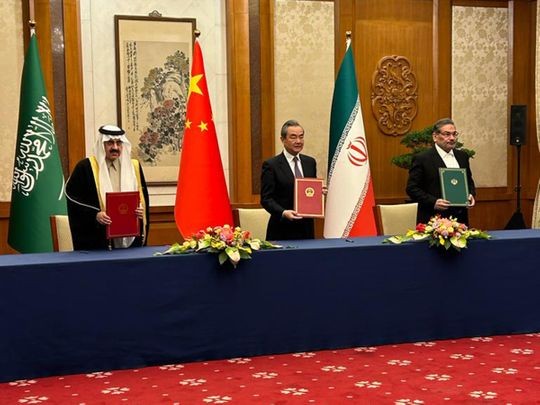The motives of the Saudi-Iranian agreement and the chances of China`s success
China`s role in mediating the agreement between Saudi Arabia and Iran highlights the shared interests of all three parties in reaching such a deal. The negotiations started in Iraq focused onto the concerns of key stakeholders. China`s diplomatic success in this matter largely depends on Iran`s commitment to the agreement and its ability to navigate internal and external challenges, particularly in regard to issues of sovereignty in influential countries. While there may be skepticism surrounding China`s intentions, the United States has a significant stake in the outcome of these diplomatic efforts, regardless of whether they ultimately succeed or fail.

- by Rasha Al Joundy ,
- Thursday, 23rd March, 2023
Motives of Saudi Arabia
Saudi Arabia has participated in several rounds of negotiations, facilitated primarily by Iraq, to discuss the restoration of relations with Iran and explore potential solutions to their disputes. While the Iraqi intermediation enabled the two parties to meet after years of disagreement, no agreement was ultimately reached. As a result, China's sponsorship of an agreement with Iran offers credibility and assurance that Iran will adhere to the terms established and signed in Beijing.
With the recent bilateral agreement signed by Saudi Arabia and Iran, there is an expectation that Iran will fulfill its commitments to non-interference and respect for sovereignty. The agreement does not specify the consequences for failing to meet these commitments. In exchange, Saudi Arabia has made a significant diplomatic breakthrough by restoring embassies and re-establishing relations with Iran in the region. This is a particularly advantageous development for Iran, which has been grappling with substantial economic, social, and political issues.
While restoring relations with Iran may not be a goal in itself for Saudi Arabia, the decision to sign the agreement under China's sponsorship highlights its significance. Despite numerous leaks and media pressure from Iranian officials during negotiations in Iraq, Saudi Arabia had refrained from entering into such an agreement in the past.
The ultimate objective of Saudi Arabia is to achieve regional peace, which would allow for the completion of the economic and social transformation initiated by King Salman bin Abdulaziz and Crown Prince Mohammed bin Salman through Vision 2030.
In fact, keeping pace with the rapid economic, financial, and technological changes in Saudi Arabia has been a persistent challenge, surprising even those who have followed the nation's politics over the past two decades.
The marked differences in the speed and flexibility of changing strategies, laws, and positions between one decade and another are striking. However, to successfully complete the reform process, Saudi Arabia requires security and the cessation of external threats to its development, infrastructure, and foreign investments. This is the core reason behind the nation's willingness to restore relations.
In the Gulf states, especially in Saudi Arabia and the United Arab Emirates, development and prosperity cannot be achieved under conflicts. The inclusion of Iran in the transformation process would greatly enhance the resolution of regional conflicts and the scope of a regional pursue of success.
Possibility of Embarrassing China
For China, the success of its first mediation effort in the Middle East depends heavily on Iran's cooperation, especially that of the Revolutionary Guards and their external allies. This includes the Houthi rebels in Yemen, the Al-Hashed Al-Shabi, and other Iranian-affiliated militias in Iraq, and the Lebanese Hezbollah militia. However, ensuring commitment to the agreement is a formidable challenge for China as it may not fully understand the depth of the Islamic Republic of Iran's expansionist policy over the past four decades.
If Iran or its proxies were to violate the agreement brokered by China, it would put China's leadership in an embarrassing position and could potentially harm their relationship. Iran has worked to cultivate this relationship with China to gain leverage and influence through its ties to the world's second-largest economy. By supporting an international coalition that counterbalances the Western alliance led by the United States, Iran also seeks to divert attention from its perceived status as a rogue state.
If Iran's relationship with China were to deteriorate or stagnate, it could significantly shift the power dynamics in favour of Saudi Arabia. Since King Salman bin Abdulaziz came to power, the kingdom has worked to build a relationship of trust with President Xi Jinping. China is a crucial economic partner for Saudi Arabia, playing a significant role in investments, industrial development, and as a major importer of energy resources. Furthermore, If the agreement brokered by China fails, the United States' role in the region's diplomatic process will become more significant, potentially undermining future mediation efforts by China. Additionally, a failed agreement could weaken the alliance between China and Iran, which is being formed to counterbalance the Western coalition led by the United States. This could lead to a diminished level of trust between the two leaderships.
If Iran chooses to comply with the Beijing agreement, it could uncover strategic opportunities to bolster its internal economy, which is currently facing significant challenges and ongoing social unrest. Protests are directed against the Iranian Islamic government and its association with widespread repression, which has become increasingly intolerable. This is particularly relevant given the rapid shifts in Saudi Arabia's landscape, which have left Iran isolated alongside regressive states like Afghanistan in terms of women's suppression and the imposition of restrictions on their lives, movement, and appearance. This characterization does not perceived to concur with Persian Iran, a nation that allegedly values its history and culture and views them as superior to those of its regional counterparts. The stereotype that Iran always seeks to tie to its Arab Neighbors is now threatening Iran itself and it’s a stereotype proved difficult to overcome.
Challenges Facing the Diplomatic Priorities of the United States
It would be inaccurate to assume that the United States cannot secure an agreement similar to China's with Iran. Washington possesses significant international economic leverage, which could compel Iran to enter into a similar arrangement, as China has done. However, the United States' objectives differ from those of China, and may be more aligned with what Iran is willing to accept and believes will be beneficial.
Unlike China, The United States is not interested in seeking an agreement that provides substantial economic benefits to Iran without abandoning its nuclear project. Furthermore, Iran has not demonstrated genuine commitment to abandoning the agreement, which it originally signed with the Obama administration in 2015. This lack of transparency was one of the reasons why President Trump withdrew from the agreement in 2018.
Due to the complex nature of the tensions between the United States and Iran, as well as the mutual distrust between the two parties, the Biden administration has resorted to imposing additional sanctions and economic pressure on Iran and its officials. The objective is to compel Iran to make a decision to engage and return to a new nuclear agreement.
The American media and research centers are closely analyzing the intentions of U.S. allies in relation to China. They are also scrutinizing China's motives and its recent involvement in a region that has been allied with Washington since the end of World War II and is still under the security umbrella of the U.S. military. This alliance is still there, and communication between Saudi Arabia and the Biden administration has significantly strengthened, particularly following the visit to Saudi Arabia in July. As a result, any crisis rhetoric may not be seen as convincing.
Away from the newsletters Propaganda, In a higher level of American political debates. There is probably a realization that a genuine Iranian commitment to the agreement guaranteed by China could offer an opportunity to alter the core Nature of the Iranian regime. And as a consequence, Iran may not become a steadfast ally of China or Russia on the long term. Adherence to the agreement with Saudi Arabia would require changes to the Iranian regime and its external proxies’ daily practices. This presents a potential opportunity for the US to achieve a strategic goal without the need for a direct involvement, and without providing a pre-implementation lucrative gain, which what occurred in 2015.
The United States has expressed its desire to see changes in the behaviour and policies of the Iranian government, particularly with regards to its nuclear program and support for regional militias. Additionally, the United States aims to counter threats posed by Iran to oil production sites in the region by supporting its allies’ militias, engaging in military operations, and formating failed states in the Middle East.
The United States' direct engagement in military operations in the region prevented it from transferring the responsibility of security protection to its allies. This was seen in Iraq after President Obama's withdrawal in 2011 and the subsequent rise of ISIS, which led to the formation of the international coalition against ISIS in 2014. From this perspective, the Biden administration may view China's involvement in the region as a potential opportunity to reduce the burden of the U.S. military presence and operations despite questioning china’s motivation in securing the agreement itself.
The Success of the Chinese Mediation
China's successful mediation is not related to the United States' failure to garner support from its allies or to persuade Iran to sign an agreement. Instead, it is due to China's pragmatic approach that focuses on achievable goals rather than particular demands. Saudi Arabia and the other Gulf countries have legitimate concerns about Iran's potential nuclear capabilities, as it could significantly shift the military and technological power balance in Iran's favour. However, this fear is not driven by the belief that Iran would target Gulf countries with nuclear weapons, as the repercussions of such an action would be dire for Iran itself. As a result, preventing a strategic power imbalance does not need to be achieved immediately.
The current situation presents an opportunity to achieve a more persistent goal for Saudi Arabia which is the respect for sovereignty of states in the region, and a commitment not interfere with internal stability. This involves refraining from actions such as utilizing Iranian-backed militias, launching ballistic missiles, or using explosive-laden boats in energy maritime corridors. Such threats are deemed more significant and perilous from a military perspective for Gulf states than nuclear weapons in their conventional sense. Establishing such priorities is not only essential for Saudi Arabia but also for China, which relies heavily on oil imports from the region.
The agreement to uphold sovereignty presents opportunities to address long-standing regional issues, including the ongoing conflict in Yemen. For years, Yemen has been utilized as a leverage tool against the countries of the Arab coalition, particularly Saudi Arabia. The agreement could also have positive repercussions on the crisis in states deemed under Iran’s influence such as Syria, Iraq, Lebanon that face many security, economic, political dilemmas, and certainly related to how Iran is perceived by its neighbors and the international community.
The success of China's mediation efforts in the ongoing debate depends on the commitment of all involved parties to their explicit and implicit interests, including those of the United States, Saudi Arabia, the Arab countries, and Iran. The focus will be on Iran's actual behaviour, rather than its propaganda, as it has many destabilizing elements, ranging from the interest-groups linked to its militias; to internal corruption circles, that could potentially hinder any change in the regime's policy or its relationships with neighbouring countries.
While the challenge primarily lies with Iran, the outcomes, whether positive or negative, will be faced by all nations invested in the future of the Middle East.

Rasha Al Joundy
Research Supervisor
Read More
Areas of Expertise
- Expert in the Gulf region politics,
- Security and internal affairs and has been working on the GCC region since 2011.
Education
- Master’s degree in International Relations and World Order at Leicester University (UK 2016).
- Graduated from the Faculty of Law – University of Damascus in Syria in 2006
Bio
completed her master’s degree in International Relations and World Order at Leicester University (UK 2016). She graduated from the Faculty of Law – University of Damascus in Syria in 2006, and trained as a lawyer to register at Damascus bar association. She is an expert in the Gulf region politics, security and internal affairs and has been working on this region since 2011. Rasha Currently work as a senior researcher for Gulf affairs and supervise the training program at Dubai Pubic Policy Research Centre.

